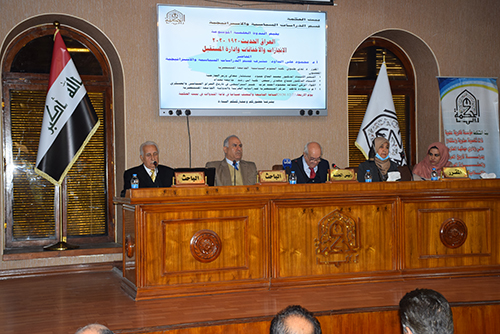|
Modern Iraq 1920-2020 Achievements, failures and future management
2020-12-23

Modern Iraq 1920-2020
Achievements, failures and future management
The House of Wisdom Department of Political and Strategic Studies held a scientific symposium on Wednesday morning, corresponding to 12/23/2020 entitled (Modern Iraq 1920-2020 Achievements, Failures and Future Management) to be delivered by Prof. Dr. Mahmoud Ali AlDawood - Supervisor of the Department of Political and Strategic Studies at the seminar hall in the House of Wisdom.
The symposium will be decided by Dr. nada Elabody. The Chairman of the Board of Trustees of House of Wisdom and a number of people interested in political affairs attended.
Each of the gentlemen below participated in the comments:
Prof. Dr. Sabah Mahdi Rumaidh - Ibn Rushd College / University of Baghdad.
Retired Major General Mahmoud Ahmed Ezzat / strategic expert in the political and military history of Iraq.
- Prof. Sudad Kazem / Al-Mustansiriya Center for Arab and International Studies - Al-Mustansiriya University.
To begin with, the lecturer briefly and richly spoke about a hundred years of achievements, suggestions and his vision for the future from 1920 to 2020.
The lecturer shed light on this era through three phases, the first phase being the achievements and mentioning many of the achievements made in Iraq at that time, where ambitious development began through building universities and sending missions and the role of women in education and other institutions.
He also mentioned the important achievements in the monarchy, especially the first ten years of rule, in which the most important event is the establishment of modern Iraq.
The second stage, failures, the researcher presented a number of failures, most notably political, economic, social and finally security diseases.
The researcher said that among the most important reasons for these failures is the lack of a sense of citizenship, the questioning of the Iraqi identity, the absence of democracy, the failure of the successive governments of the country to understand international relations, dealing with great countries, the ambitions of neighboring countries, and many other reasons.
As for the last stage that the lecturers talked about, it is managing the future. Despite everything that Iraq is going through, it can rise to its human wealth capable of giving and superiority and its oil and agricultural wealth.
Conclusion:
The imperative to work for a unified Iraqi identity and a sense of belonging and patriotism.
Providing the opportunity for a better healthy, political and social life.
Setting original plans to advance the Iraqi reality and its wealth.
Then came the feedback, where the distinguished reviewers expressed the study of Dr. Mahmoud Al-Daoud, who praised it and urged the diagnosis of the causes by investing in solutions to achieve new achievements worthy of the history of Iraq. |